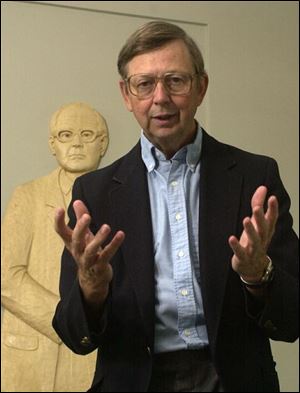
Priest blames poor training for scandal
2/5/2003
Bacik: says priests are unprepared.
For decades, Catholic seminaries failed to screen out potential problem priests and provided “the worst-possible” training for real-life ministry, the Rev. James Bacik said in a speech yesterday to the Toledo Bar Association.
In a 30-minute lunchtime talk to 70 lawyers at the group's downtown offices, the priest and theologian said the lack of psychological screening and the poor preparation were key factors in the scandal involving sexual abuse of minors by priests.
While the church has taken some positive steps, including tightening standards for the seminary, Father Bacik said the recent implementation of priest tribunals to rule on abuse allegations is bound to “backfire” on the church.
The three-priest panels, now being set up regionally, will rule in abuse cases if a priest denies the allegations. But abuse victims won't accept the judgment of priests who are part of the same “clerical culture” as the alleged offenders, Father Bacik said.
The 66-year-old pastor of Toledo's Corpus Christi University Parish said when he was in the seminary in the late 1950s and early '60s, graduates were woefully unprepared for the challenges they would face.
“Seminary was a horrible place to be,” Father Bacik said. “It was a stultifying atmosphere that was all-male. All contacts with the outside world were limited. There was no normal interaction with women. It was a very difficult environment even to survive in, let alone achieve some sort of healthy psychosexual development.”
Pointing out that 80 percent of abuse victims were minor males, Father Bacik said another theory on the crisis - espoused by some Vatican officials - is that there are too many gays in the priesthood. He cited a national survey by the Los Angeles Times in which 23 percent of priests polled identified themselves as homosexual or homosexually oriented.
Surveys show that about 1.8 percent of priests have been accused of sexual misconduct nationwide, Father Bacik said, adding that most priests are angry over the church scandal.
Many priests are upset with their bishops and cardinals for covering up abuses, he said. Some feel “hung out to dry” by the bishops' ‘‘zero-tolerance” policy. Many believe the media have overplayed the crisis.
There are, however, some “rays of hope” emanating from the situation, Father Bacik said.
Among the positive signs is a trend toward greater cooperation between laity and clergy in seeking solutions, he said. He also is encouraged that the 4,000 victims who have come forward in the last year can now seek spiritual and psychological counseling.
Father Bacik said while priests have often been “put on pedestals and protected,” in the future they likely will be more empathetic.
He also hoped that the crisis will bring a “radical rethinking of how we assemble candidates for the priesthood,” including the possible ordination of women and married people.
During a 20-minute question-and-answer segment, Father Bacik acknowledged that the Vatican has banned debate on women priests but added wryly that “some people are still talking about it. Sometimes these things don't seem totally controllable.”